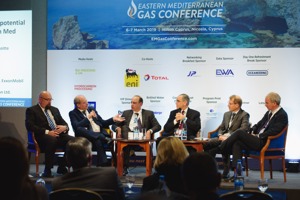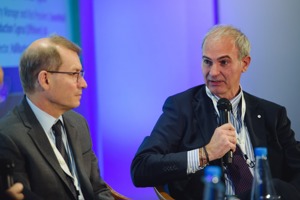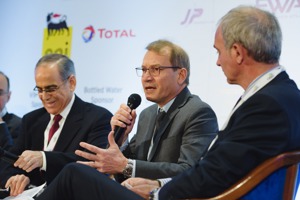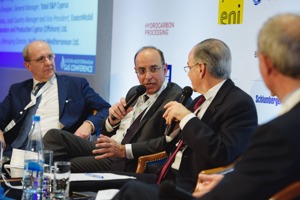EMGC '19: Operators demand dedicated Cyprus port, tout service advantages
By Adrienne Blume, Gas Processing & LNG and Hydrocarbon Processing
NICOSIA—An afternoon panel of operators closed out the second day of the Eastern Mediterranean Gas Conference (EMGC 2019). The panel, which was moderated by Nicos Papakyriacou, Partner and Cyprus Oil & Gas Leader at Deloitte, showcased the views of executives at major operators working in Cyprus and the greater Eastern Mediterranean region.
The panelists included Yves Grosjean, General Manager, Total E&P Cyprus; Alessandro Barberis, Managing Director, Eni Cyprus; Varnavas Theodossiou, Lead Country Manager and Vice President, ExxonMobil Exploration and Production Cyprus (Offshore) Ltd.; Jorgen Berg, Managing Director, Schlumberger; and Dario Vitale, Managing Director, Halliburton Mediterranean Ltd.
Cyprus: Energy hub or service center? Speaking about the potential for Cyprus to become an energy hub, Mr. Grosjean said, "An energy hub is a system consisting of energy storage and transport infrastructure, as well as conversion between different energy carriers, in order to provide flexibility to the market." However, as Cyprus is a "frontier exploration," Mr. Grosjean noted that it will take 5–10 years for the country to become an energy hub.
"However, when we talk about an oil and gas service center, we are talking about an urgent need that will not go away … These operations require specialized assistance from specialized companies—in some cases, up to 20 different companies working with one operator for drilling one well."
These companies must deploy their technologies in a highly efficient and cost-effective way in deepwater offshore areas, requiring highly skilled technicians and equipment, as well as people to troubleshoot and maintain the equipment, Mr. Grosjean said. Support from onshore is needed, providing an opportunity for Cyprus to gather these resources into an onshore logistics base and to become an oil and gas service center for the region.
Mr. Berg added, "I think the definition of an energy hub versus a service center is very critical, and I think it's important that we get that nailed down because they're two different things. If we focus on the service center, I think there is a huge opportunity for Cyprus here—something like Singapore 5–10 years ago."
Dedicated energy port is a 'must-have.' Mr. Barberis noted that Cyprus lacks sufficient infrastructure, including port facilities to handle the oil and gas business. "Currently, we as operators are forced to use the only oil and gas space available, which is the Limassol port," he said. "We need an alternative, and we need to think beyond the long term of the Vasilikos port project targeted for 2023; we need to think in the medium term."
Mr. Theodossiou agreed that a dedicated oil and gas port is needed to provide an incentive for operators to establish and expand bases in the country. "We can't wait until the Vasilikos port project is finished in 2023. Maybe Cyprus can expand the Limassol port; maybe we can use Larnaca. But the current port situation is not sustainable for operators."
"A port will obviously be a critical part of such a service center," Mr. Berg added. The center would need to accommodate pipeworks, maintenance, recertifications, and many other services by a number of service companies. Some of these companies would be seeking permanent footprints; others would work there temporarily.
A service center in Cyprus would need to accommodate these growing needs. "I think it's important to assess the needs of the industry, and certainly a port is one of those needs," Mr. Berg said. "But it should be done right … The government needs to lead this [initiative]. If it doesn't, then we as operators will follow our own interests elsewhere."
Mr. Vitale agreed with the other panelists on the lack of a dedicated energy port as Cyprus operators' biggest problem. "Vasilikos port is important, yes, but it's five years away," he said. "We need something in the shorter term. There's no need to reinvent the wheel, but we do need to work with the government to make this happen."
"We need to concentrate on infrastructure," Mr. Theodossiou added. "Commercializing the resource by bringing it to Cyprus, and then processing it and exporting it, could provide economic benefits for the Cyprus government, as well as knock-down benefits for other Cyprus businesses."
Advantages and challenges for operators in Cyprus. When asked about the existing advantages and challenges of Cyprus becoming a service center for the region, Mr. Barberis said, "Cyprus has several advantages. It has a central position, which is a crucial element because distance from facilities can make an oil or gas project viable or not viable. Since Cyprus is right in the middle of the Eastern Med, it has good position to serve the entire region. Cyprus is also the only state in the region that belongs to the EU, which brings a legal political framework. Cyprus is also a very attractive fiscal regime and has an efficient customs system in place. These are all positive elements."
Mr. Grosjean noted that he is impressed by the number of service companies that visit him with a willingness to set up or expand their service base in Cyprus. "These are good, highly skilled people," he asserted. "If I had one tip to give to the [Cyprus] government, it would be to listen to these [service] people, and not just to us [the operators], and the government will see their willingness to expand the industrial business of Cyprus."
Among the challenges Cyprus must face, Mr. Barberis noted, "Cyprus is still substantially in an exploration phase, which puts the country in a constant learning curve for the oil and gas business. Then there is the time factor. Neighboring countries, such as Egypt, are moving at a different pace for putting in place the elements needed to develop an energy hub."
Cyprus must act now or it will risk losing the possibility of becoming an oil and gas hub, Mr. Barberis said. If the Cyprus government gives incentives to operators, it will go a long way toward helping create an environment where such a hub could flourish.
ExxonMobil benefits from Cypriot efficiency. Regarding ExxonMobil's ongoing exploration and drilling work in Cyprus, Mr. Theodossiou explained, "Before making a new entry, we [at ExxonMobil] look to see if there is a stable and predictable investment climate. We are here for the longer term. We spend 5–10 years to explore and develop, and then spend another 5–10 years to produce."
"Cyprus also has a well-defined legal framework, a robust tax regime, and is stable for business, and it takes away a lot of the guesswork required for doing business quickly. It took only three months to sign a very complicated contract for Block 10, whereas in some countries it would have taken three years. From there, it took only 22 months to drill two back-to-back wells," Mr. Theodossiou said.
"Cyprus is also full of talented individuals who can work in the oil and gas industry. In our business in Cyprus, 90% of the workers are Cypriots. Also, it takes only about three weeks to get work permits for foreign workers, versus nine months in other places. These are some of the good examples we've had working in Cyprus so far."










Comments